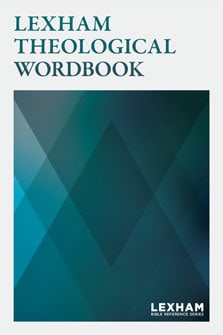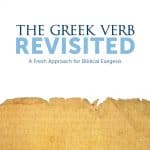
Earlier this week, Jake demonstrated the power of the Lexham Theological Wordbook for understanding the full meaning of biblical concepts. Today, I?m going to walk through an example study, to demonstrate how it works. We?ll examine the biblical concept of apostasy.
The Lexham Theological Wordbook entry for apostasy starts with a concise definition.
Apostasy is the turning away from God in rebellion or apathy. God?s people must beware of inward rebelliousness as much as the outward wickedness that manifests such rebellion.
Next we?ll find a concept summary. This quickly overviews the main Hebrew and Greek words used to express the biblical concept.
The OT describes apostasy using words for rebellion (,????? m?r?, ?to rebel?; Neh 9:26) and turning away in rejection (,????????? m???b?, ?backsliding?; Jer 8:5). God?s people are supposed to ?turn? back (?????, ??b; Jer 8:5) to God but instead they ?turn? away (?????, ??b; Judg 2:23) or ?fall away? (?????????, parapipt?; Heb 6:6) from God. Sometimes this is the result of pursuing other gods instead of Yahweh (1 Kgs 11:9; Jer 3:6?10; Hos 11:7) and ignoring the appeals for repentance from God or his messengers (Jer 3:14?23; 5:3?5). In Deuteronomy, apostasy is pictured as people being drawn away (?????, n?da?) to serve other gods through the influence of ?worthless men? (Deut 13:12?18). Other times apostasy is manifested as disregard for God and rebellion (???????, p??a?) against God (Jer 2:5?8, 19). In Ezekiel and Jeremiah, the people of Israel are depicted as predisposed to rebellion and apostasy (Ezek 2:3?7; 12:1?2; Jer 8:5).
The NT also depicts people turning away (?????????, aperchomai) from following Jesus (John 6:66), being ignorant or resistant to the ?life of God? (Eph 4:18), ?falling away? (????????, aphist?mi) from God (Heb 3:12), or making ?shipwreck of their faith? (1 Tim 1:19). In the last days, Jesus predicts many people will ?fall away? (??????????, skandaliz?) and that false prophets will ?lead astray? many (??????, plana?; Matt 24:10?11).
Then we get to the theological overview. Here we see the concept fleshed out in detail, and we learn how it affects the overall theology of the Bible.
The biblical passages that cover apostasy in both the OT and the NT fall into two general categories: passages warning against turning away from Yahweh and passages describing how the people have turned away from Yahweh. In Deuteronomy, Moses warns the Israelites against turning away from God (Deut 8:11?14) and provides legal regulations about dealing with people who do turn away to serve other gods (Deut 13:12?18). In 1 Kings 9, God warns Solomon of judgment against Israel if they turn away from him (1 Kgs 9:6?8; compare 2 Chr 7:19?22). A few chapters later the text reports that God was angry with Solomon because ?he had turned his heart from Yahweh? (1 Kgs 11:9). In the NT, the clearest warnings against apostasy are found in Heb 3:12 and 2 Pet 3:17. Both passages caution against falling away into unbelief and encourage reliance on fellow believers and a shared commitment to Christ (Heb 3:12?14; 2 Pet 3:17?18).
Israel?s idolatry and apostasy is one of the major themes of the OT. The covenant warned against worshiping other gods (Exod 20:1?2; Deut 5:7?8; 13:12?18), the Historical Books describe Israel?s continual turning from Yahweh (Judg 2:11?23; 2 Kgs 21:1?9), and the prophets linked their apostasy with the looming threat of judgment and exile (2 Kgs 21:10?15; Jer 2:1?3:5). Despite the many warnings from prophets like Jeremiah, the people refused to repent and continued in their apostasy (Jer 8:5), leading to their defeat and exile (2 Kgs 24?25).
A few NT passages describe people leaving the faith or turning away from following the apostles. In 2 Timothy 1:15, Paul remarks how a number of people have ?turned away? (?????????, apostreph?) from him, though whether that means they abandoned faith in Christ completely is uncertain. The Apostle John also warns against false teachers (or antichrists) who could potentially mislead believers (1 John 2:18?19). He appears to refer to a group of people who had ?gone out? (?????????, exerchomai) from the congregation and uses the fact of their departure as a sign that they lacked genuine faith. John?s concern for antichrists in the last days leading away believers echoes Jesus? warning that such things would certainly happen during the last days (Matt 24:10?11). Some NT passages reflect hope that those who turn away from Jesus will repent and return (Jas 5:19?20; Rev 2:4?6). The possibility of permanent apostasy seems suggested by Heb 6:4?6, though the wider context of Heb 6 suggests the underlying issue is continued rebellion against God and hard-hearted opposition to the gospel?not that the people cannot turn from their apostasy but that, like Israel, they refuse to return.
With a thorough understanding of the concept in place, we now come to the detailed definitions for individual words. Unlike most standard lexicons, the Lexham Theological Wordbook defines words in the context of the concept being discussed. So in this case, the words will all be defined in relation to apostasy.
The full entry on apostasy includes definitions for five Hebrew and ten Greek words. To prevent this blog post from becoming overly long, we?ll just take a look at two of each for now.
Old Testament
????????? (m???b?). n. backsliding, apostasy, falling away. Refers to turning away from God to a life lived like those who are apart from God.
This word is related to the verb ????? (??b, ?to turn? or ?to return?). Unlike the verb, which has a broad range of senses, m???b? refers specifically to turning away from God toward godlessness in belief, worship, and lifestyle. It is used mostly in Jeremiah (e.g., Jer 3:6; 14:7), where it is used as an adjective (e.g., ?backsliding Israel? in Jer 3:11) as well as a noun (e.g., Jer 2:19). It also appears in Hosea: God says that his people are bent on ?turning away? (m???b?) from him (Hos 11:7) but promises that he will heal their apostasy (m???b?; Hos 14:4). Outside the Prophetic Books, it occurs in Prov 1:32, which says that the turning away (m???b?) ?of the simple ones will kill them??that is, turning away from God and wisdom is self-destructive.
??????? (p??a?). vb. to rebel, to transgress. Refers generally to rebellion but may be used to describe rebellion against God.
The verb p??a? (and its noun form,??????? pe?a?) indicate a break in covenant relationship between two parties. In civil contexts (such as usages in Kings and Chronicles), it indicates rebellion against a king or ruler. In religious contexts (Isa 1:28; Ezek 2:3; Hos 8:1) it is used of Israel?s rebellion against Yahweh, Israel?s divine king, in violation of the covenant relationship. As such, it is often best rendered ?transgress? since it is used in relation to the covenant made between Yahweh and his people (Isa 43:27; Jer 2:8). It is important to note that this verb is never used of God but always of people.
New Testament
????????? (apostasia). n. rebellion, apostasy, abandonment. Refers to rebelling or abandoning a former authority.
The Greek word apostasia is the source of the English word ?apostasy.? It is used only twice in the NT. Acts 21:21 reports a rumor that Paul is teaching Jews to abandon (apostasia) the teachings of Moses. Second Thessalonians 2:3 foretells a great ?falling away? or ?rebellion? (apostasia) from the Christian faith before the day of Christ.
?????? (aphi?mi). vb. to leave, abandon. Refers to leaving or abandoning a place, a person, or a thing, including a belief.
The verb aphi?mi and its various forms mean to leave (or to let go) and often occurs in a literal sense (such as Jesus leaving the crowds in Matt 13:36). While aphi?mi is often used in a literal sense for physically leaving (Mark 1:20; 10:28?29), with regard to apostasy, its use in Rev 2:4 is significant since here Jesus reports that those in the church at Ephesus have ?left? or ?abandoned? the love they first had for the Lord.
The entry for apostasy wraps up with links to related concepts in the Lexham Theological Wordbook, entries in the Bible Sense Lexicon, and other resources for further study in the Logos library.
As you can see, the Lexham Theological Wordbook is truly a one-of-a kind resource. Pick up a copy in a Logos base package, and understand these biblical concepts like never before!






